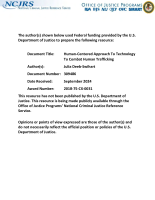District attorneys
Automated Victim Notification Systems in the Criminal Justice System
Prosecuting Child Physical Abuse Cases: A Case Study in San Diego
Frye, Daubert, and PCAST: Countering Admissibility Challenges
This training was presented as a part of the National Center on Forensics conference at George Mason University on August 8th, 20
See the YouTube Terms of Service and Google Privacy Policy
Responding to Intimate Partner Violence Related Strangulation Integrating Policy, Practice, and Rese
This webinar examines the problem of Intimate Partner Violence Strangulation and an innovative response policy. The presentation will include an overview of the nature and extent of strangulation, its dangers, and adverse medical consequences followed by a review of a Strangulation Ordinance in Burleson, Texas that mandates extensive training for first responders and a city-wide response protocol for strangulation detection and investigation, documentation of strangulation signs and symptoms, medical assistance, and service referrals for strangulation survivors.
See the YouTube Terms of Service and Google Privacy Policy
"Philadelphia Focused Deterrence Findings from the Impact Evaluation"
Advancing Justice for the Missing and Unidentified Through Research - 2024 NIJ Research Conference
Forensic science research is developing essential knowledge to fill in the holes in death investigations, creating new ways to identify challenging skeletal remains. These methods inform cause of death, time of death, and familial relationships to guide investigations, identify suspects, support prosecutions, and bring justice to families.
See the YouTube Terms of Service and Google Privacy Policy
Using Intelligence Analysis to Understand and Address Fentanyl Distribution Networks in America’s Largest Port City
The Impacts of Governing Agency: A Comparison of Resources in the Patchwork of Medicolegal Death Investigation Systems
Understanding What Works in the Identification, Investigation, and Prosecution of Labor Trafficking Cases in the United States: Improving Collaboration Between Law Enforcement Agencies and Departments of Labor Key Findings and Recommendations
Frye, Daubert, and PCAST: Countering Admissibility Challenges
Can Law Enforcement Training Address Racial and Ethnic Disproportionality? An Experimental Evaluation of Effective Youth Interactions
A Whole Community Approach to Hate Crime Reduction: Research to Improve Prevention, Reporting, and Victim Support
Beyond impunity: An evaluation of New York State's nonfatal shooting initiative
Just Science Podcast: Just Solving Cold Cases with Forensic Genetic Genealogy
Police Shootings and the Prosecutor in Los Angeles County - An Evaluation of Operation Rollout
A Landscape Study of SOPs to Collect and Process Arrestee and Convicted Offender DNA Samples
The Sexual Stratification Hypothesis and Prosecuting Sexual Assault: Is the Decision to File Charges Influenced by the Victim-Suspect Racial-Ethnic Dyad?
From Funnels to Large-Scale Irrigation: Changing the Criminal Justice System Paradigm to Improve Public Health and Safety
Booker and Beyond Analyzing Sentencing Reform and Exploring New Research Directions
This webinar features a discussion of previously published research on the U.S. Supreme Court’s 2005 Booker decision - which effectively transformed the United States Sentencing Guidelines from a mandatory, to an advisory, system. The presentation will address selected research findings from the last 15 years. Individual participants will briefly review their previous research findings with particular attention paid to the analytic methods used.
See the YouTube Terms of Service and Google Privacy Policy
Rapid DNA Crime Scene Sample Multi-Laboratory Evaluation Project
Prosecutors' Perspectives on Biological Evidence and Injury Evidence in Sexual Assault Cases
Multilevel Evaluation of Project Safe Neighborhoods
Project Safe Neighborhoods (PSN) is a DOJ-sponsored initiative to reduce violent crime, particularly gun crime, by fostering cooperation by criminal justice agencies and local partners to develop and implement strategic approaches.
See the YouTube Terms of Service and Google Privacy Policy





